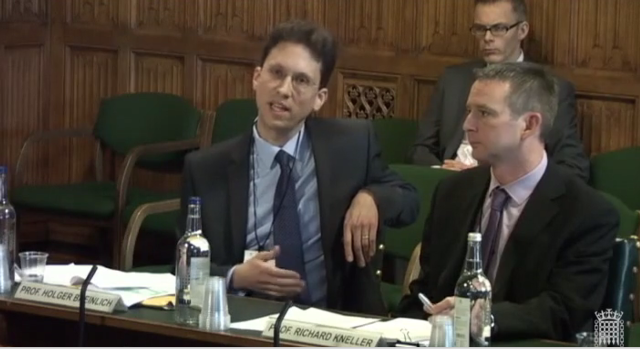
February 19, 2016, by Léonie Mathers
Pathways to Impact: giving evidence to a Government Select Committee
With a wealth of world-class research being carried out across The University of Nottingham, turning your academic research into a change in public policy can create a huge impact. But in a crowded market it can be a challenge to get your expertise noticed.
So when you get an email one Thursday in January, asking you to be at the House of Commons on Tuesday morning to argue your case in front of a panel of national policymakers, you say yes.
On Tuesday 2 February, Professor of Economics Richard Kneller and Professor of International Economics Holger Breinlich duly presented themselves to the Business, Innovation & Skills Select Committee. The panel of MPs was scrutinising Government policy on Exports and the role of UK Trade and Industry – a non-departmental body which supports companies to export from the UK.
This sort of email doesn’t come out of the blue, of course. Professors Kneller and Breinlich had spotted the call for evidence on a website listing current Government Select Committee inquiries and realised it aligned very closely with their own research. They knew they could provide useful background into export patterns, along with a critique of the lack of academic evaluation underpinning export policy.
At the start of January, the Professors submitted written evidence, emphasising their strong academic credentials and explaining their research. They kept their answers short and accessible and demonstrated how their work directly related to the issue – although four questions were posed, they stuck to answering two which were most closely related to their work.
With just two working days to prepare, Richard tells me it was ‘like revising for an exam’. The pair shared the prep, researching potential lines of questioning, thinking through points to make and writing notes to take with them on the day. They spoke via skype to the Clerk of the Committee (administrative support to the MPs) about logistics – which entrance to arrive at, how long to allow for security checks etc. – as well as the sort of questions which might be asked, and how the session would run.
On the day, the MPs were interested and engaged, with set questions being interspersed with follow-ups and genuine engagement on the points the Professors raised. Richard and Holger were careful not to stray from their area of expertise and, on the rare occasions the questions reached beyond the facts into the political arena, made it clear they could only answer about the facts.
This sort of policy engagement not only raises your own reputation and that of the wider University, but you can change public policy for the better – all on a cold Tuesday morning in February.
For more information about engaging with Parliament and Government, or to discuss other ways to take your research forward to create impact, you can contact Léonie Mathers, in the Political & Public Affairs Unit, on 07973 975055 or leonie.mathers@nottingham.ac.uk. You might also be interested in attending our Nottingham ‘Routes to Policy Impact’ Conference on May 11.
No comments yet, fill out a comment to be the first

Leave a Reply